Economics Report: Analyzing the Effects of COVID-19 on US Food Supply
VerifiedAdded on 2022/09/12
|6
|1001
|155
Report
AI Summary
This report provides a critical review of an article published on CNN Business, focusing on the impact of the coronavirus outbreak on the US agricultural sector. The report summarizes the main issues discussed, including labor shortages, supply chain disruptions, and shifts in demand. It analyzes the situation through the lens of microeconomic theory, specifically demand and supply, and discusses the potential implications of these disruptions, such as rising food prices due to decreased supply and increased demand driven by panic buying. The review concludes that the agricultural sector faces significant challenges, potentially leading to price increases for agricultural products. The report references the original article and relevant economic literature to support its analysis.
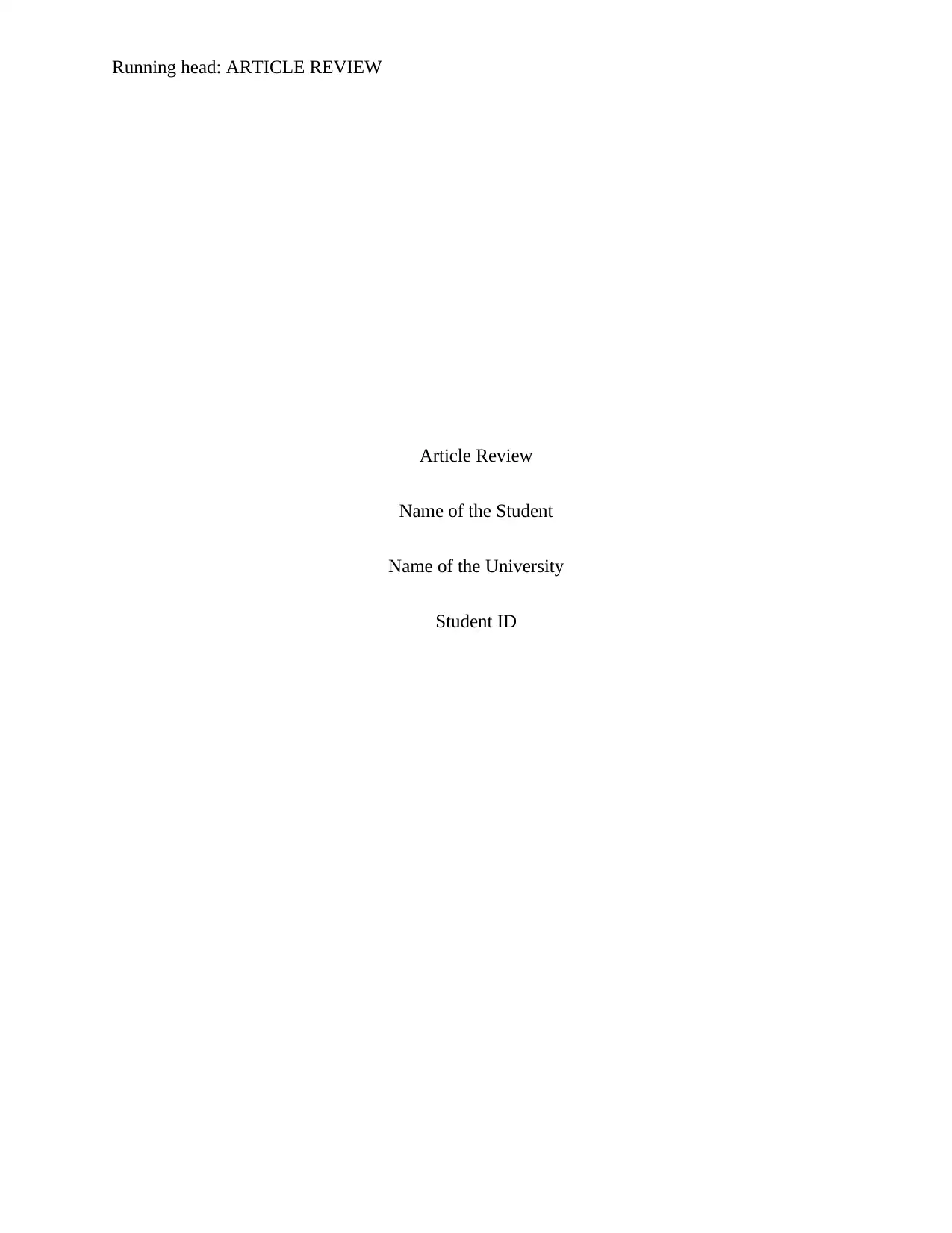
Running head: ARTICLE REVIEW
Article Review
Name of the Student
Name of the University
Student ID
Article Review
Name of the Student
Name of the University
Student ID
Paraphrase This Document
Need a fresh take? Get an instant paraphrase of this document with our AI Paraphraser
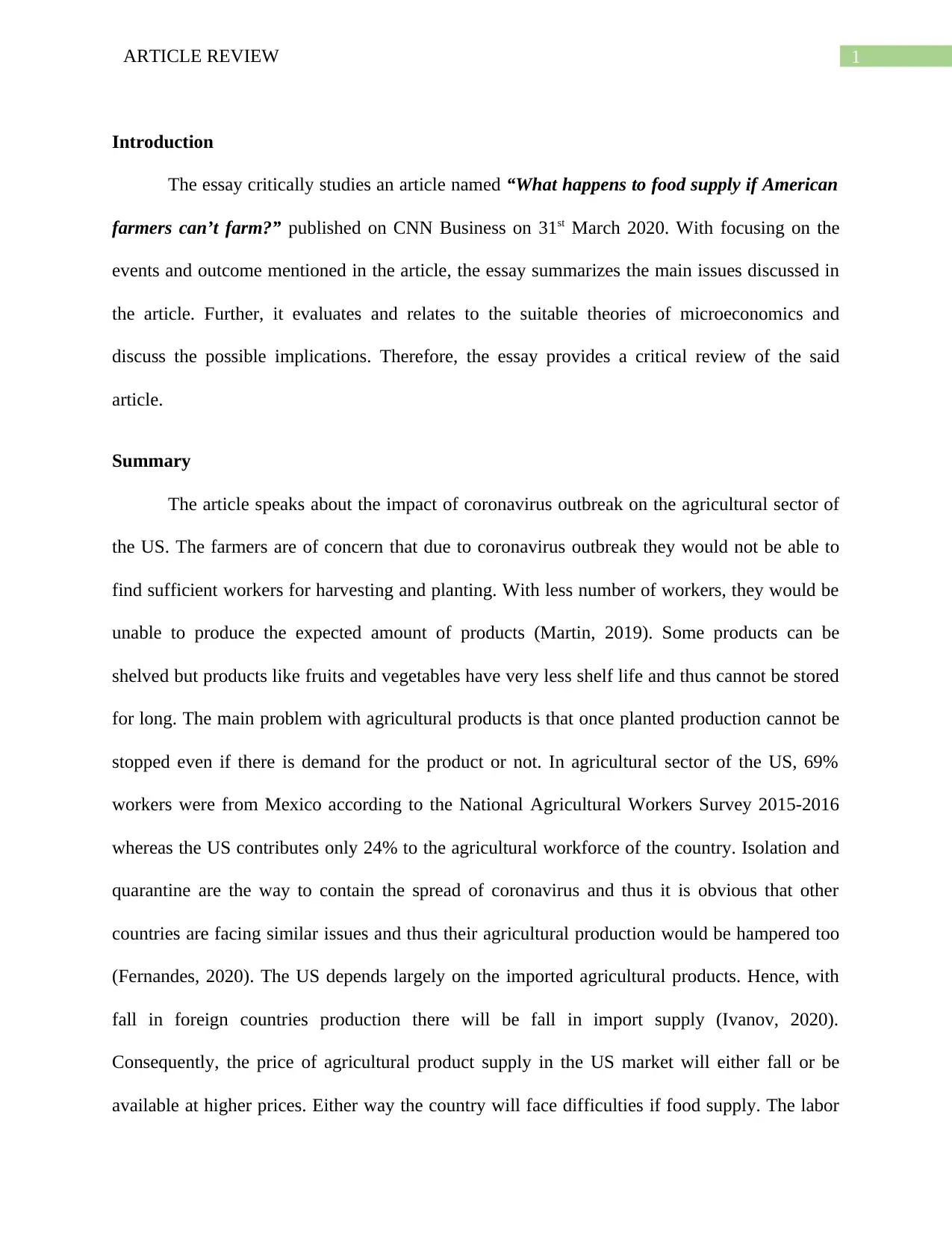
1ARTICLE REVIEW
Introduction
The essay critically studies an article named “What happens to food supply if American
farmers can’t farm?” published on CNN Business on 31st March 2020. With focusing on the
events and outcome mentioned in the article, the essay summarizes the main issues discussed in
the article. Further, it evaluates and relates to the suitable theories of microeconomics and
discuss the possible implications. Therefore, the essay provides a critical review of the said
article.
Summary
The article speaks about the impact of coronavirus outbreak on the agricultural sector of
the US. The farmers are of concern that due to coronavirus outbreak they would not be able to
find sufficient workers for harvesting and planting. With less number of workers, they would be
unable to produce the expected amount of products (Martin, 2019). Some products can be
shelved but products like fruits and vegetables have very less shelf life and thus cannot be stored
for long. The main problem with agricultural products is that once planted production cannot be
stopped even if there is demand for the product or not. In agricultural sector of the US, 69%
workers were from Mexico according to the National Agricultural Workers Survey 2015-2016
whereas the US contributes only 24% to the agricultural workforce of the country. Isolation and
quarantine are the way to contain the spread of coronavirus and thus it is obvious that other
countries are facing similar issues and thus their agricultural production would be hampered too
(Fernandes, 2020). The US depends largely on the imported agricultural products. Hence, with
fall in foreign countries production there will be fall in import supply (Ivanov, 2020).
Consequently, the price of agricultural product supply in the US market will either fall or be
available at higher prices. Either way the country will face difficulties if food supply. The labor
Introduction
The essay critically studies an article named “What happens to food supply if American
farmers can’t farm?” published on CNN Business on 31st March 2020. With focusing on the
events and outcome mentioned in the article, the essay summarizes the main issues discussed in
the article. Further, it evaluates and relates to the suitable theories of microeconomics and
discuss the possible implications. Therefore, the essay provides a critical review of the said
article.
Summary
The article speaks about the impact of coronavirus outbreak on the agricultural sector of
the US. The farmers are of concern that due to coronavirus outbreak they would not be able to
find sufficient workers for harvesting and planting. With less number of workers, they would be
unable to produce the expected amount of products (Martin, 2019). Some products can be
shelved but products like fruits and vegetables have very less shelf life and thus cannot be stored
for long. The main problem with agricultural products is that once planted production cannot be
stopped even if there is demand for the product or not. In agricultural sector of the US, 69%
workers were from Mexico according to the National Agricultural Workers Survey 2015-2016
whereas the US contributes only 24% to the agricultural workforce of the country. Isolation and
quarantine are the way to contain the spread of coronavirus and thus it is obvious that other
countries are facing similar issues and thus their agricultural production would be hampered too
(Fernandes, 2020). The US depends largely on the imported agricultural products. Hence, with
fall in foreign countries production there will be fall in import supply (Ivanov, 2020).
Consequently, the price of agricultural product supply in the US market will either fall or be
available at higher prices. Either way the country will face difficulties if food supply. The labor
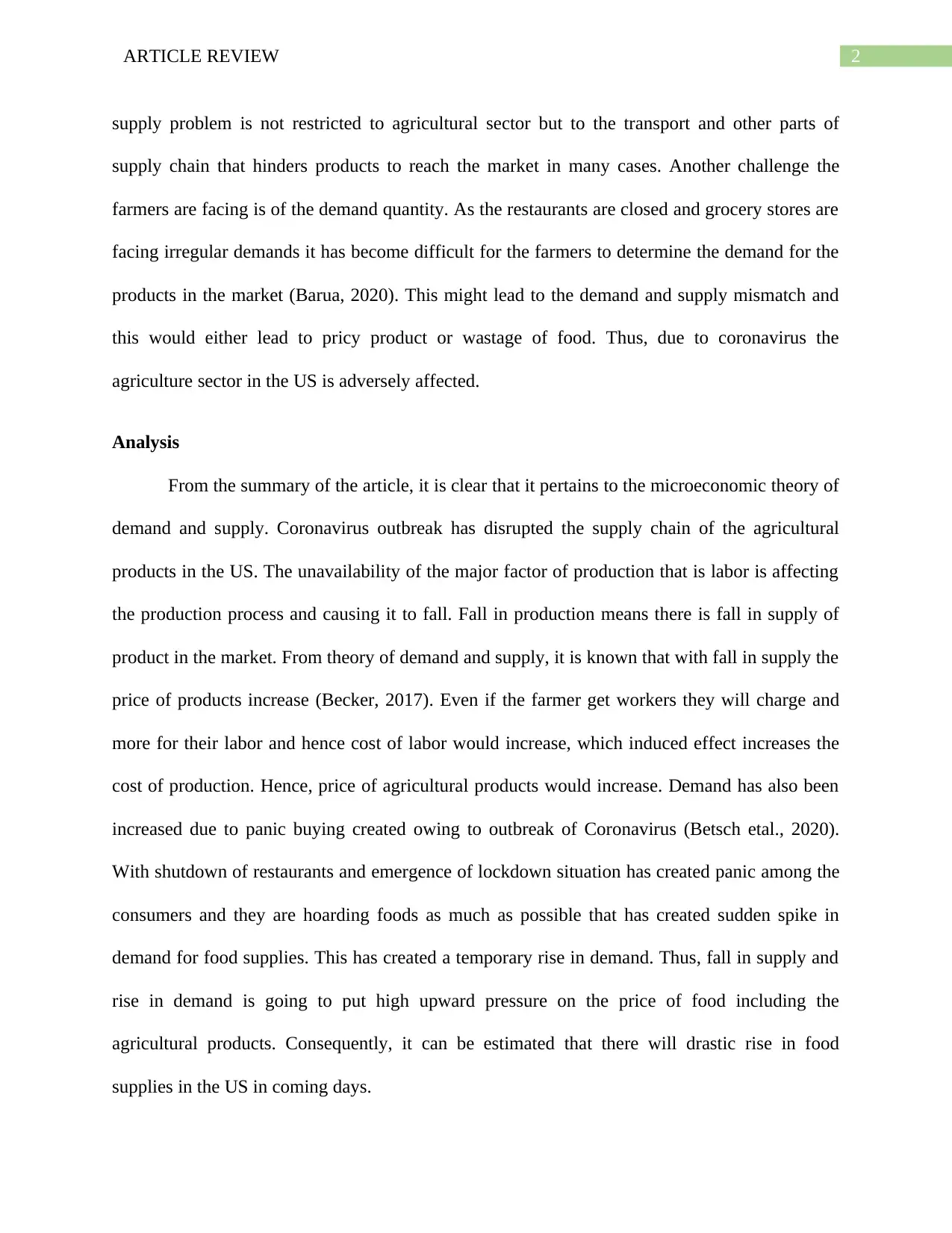
2ARTICLE REVIEW
supply problem is not restricted to agricultural sector but to the transport and other parts of
supply chain that hinders products to reach the market in many cases. Another challenge the
farmers are facing is of the demand quantity. As the restaurants are closed and grocery stores are
facing irregular demands it has become difficult for the farmers to determine the demand for the
products in the market (Barua, 2020). This might lead to the demand and supply mismatch and
this would either lead to pricy product or wastage of food. Thus, due to coronavirus the
agriculture sector in the US is adversely affected.
Analysis
From the summary of the article, it is clear that it pertains to the microeconomic theory of
demand and supply. Coronavirus outbreak has disrupted the supply chain of the agricultural
products in the US. The unavailability of the major factor of production that is labor is affecting
the production process and causing it to fall. Fall in production means there is fall in supply of
product in the market. From theory of demand and supply, it is known that with fall in supply the
price of products increase (Becker, 2017). Even if the farmer get workers they will charge and
more for their labor and hence cost of labor would increase, which induced effect increases the
cost of production. Hence, price of agricultural products would increase. Demand has also been
increased due to panic buying created owing to outbreak of Coronavirus (Betsch etal., 2020).
With shutdown of restaurants and emergence of lockdown situation has created panic among the
consumers and they are hoarding foods as much as possible that has created sudden spike in
demand for food supplies. This has created a temporary rise in demand. Thus, fall in supply and
rise in demand is going to put high upward pressure on the price of food including the
agricultural products. Consequently, it can be estimated that there will drastic rise in food
supplies in the US in coming days.
supply problem is not restricted to agricultural sector but to the transport and other parts of
supply chain that hinders products to reach the market in many cases. Another challenge the
farmers are facing is of the demand quantity. As the restaurants are closed and grocery stores are
facing irregular demands it has become difficult for the farmers to determine the demand for the
products in the market (Barua, 2020). This might lead to the demand and supply mismatch and
this would either lead to pricy product or wastage of food. Thus, due to coronavirus the
agriculture sector in the US is adversely affected.
Analysis
From the summary of the article, it is clear that it pertains to the microeconomic theory of
demand and supply. Coronavirus outbreak has disrupted the supply chain of the agricultural
products in the US. The unavailability of the major factor of production that is labor is affecting
the production process and causing it to fall. Fall in production means there is fall in supply of
product in the market. From theory of demand and supply, it is known that with fall in supply the
price of products increase (Becker, 2017). Even if the farmer get workers they will charge and
more for their labor and hence cost of labor would increase, which induced effect increases the
cost of production. Hence, price of agricultural products would increase. Demand has also been
increased due to panic buying created owing to outbreak of Coronavirus (Betsch etal., 2020).
With shutdown of restaurants and emergence of lockdown situation has created panic among the
consumers and they are hoarding foods as much as possible that has created sudden spike in
demand for food supplies. This has created a temporary rise in demand. Thus, fall in supply and
rise in demand is going to put high upward pressure on the price of food including the
agricultural products. Consequently, it can be estimated that there will drastic rise in food
supplies in the US in coming days.
⊘ This is a preview!⊘
Do you want full access?
Subscribe today to unlock all pages.

Trusted by 1+ million students worldwide
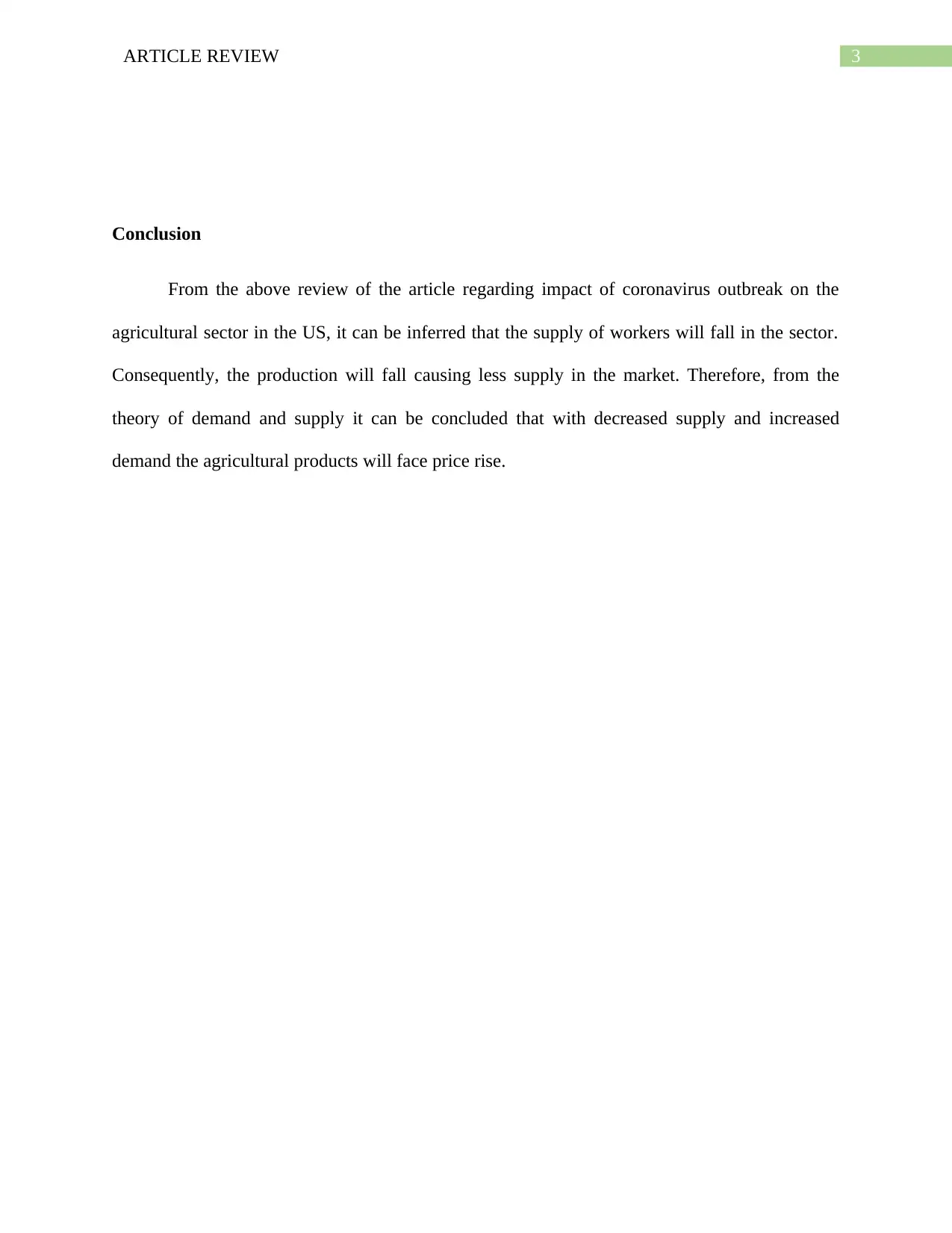
3ARTICLE REVIEW
Conclusion
From the above review of the article regarding impact of coronavirus outbreak on the
agricultural sector in the US, it can be inferred that the supply of workers will fall in the sector.
Consequently, the production will fall causing less supply in the market. Therefore, from the
theory of demand and supply it can be concluded that with decreased supply and increased
demand the agricultural products will face price rise.
Conclusion
From the above review of the article regarding impact of coronavirus outbreak on the
agricultural sector in the US, it can be inferred that the supply of workers will fall in the sector.
Consequently, the production will fall causing less supply in the market. Therefore, from the
theory of demand and supply it can be concluded that with decreased supply and increased
demand the agricultural products will face price rise.
Paraphrase This Document
Need a fresh take? Get an instant paraphrase of this document with our AI Paraphraser
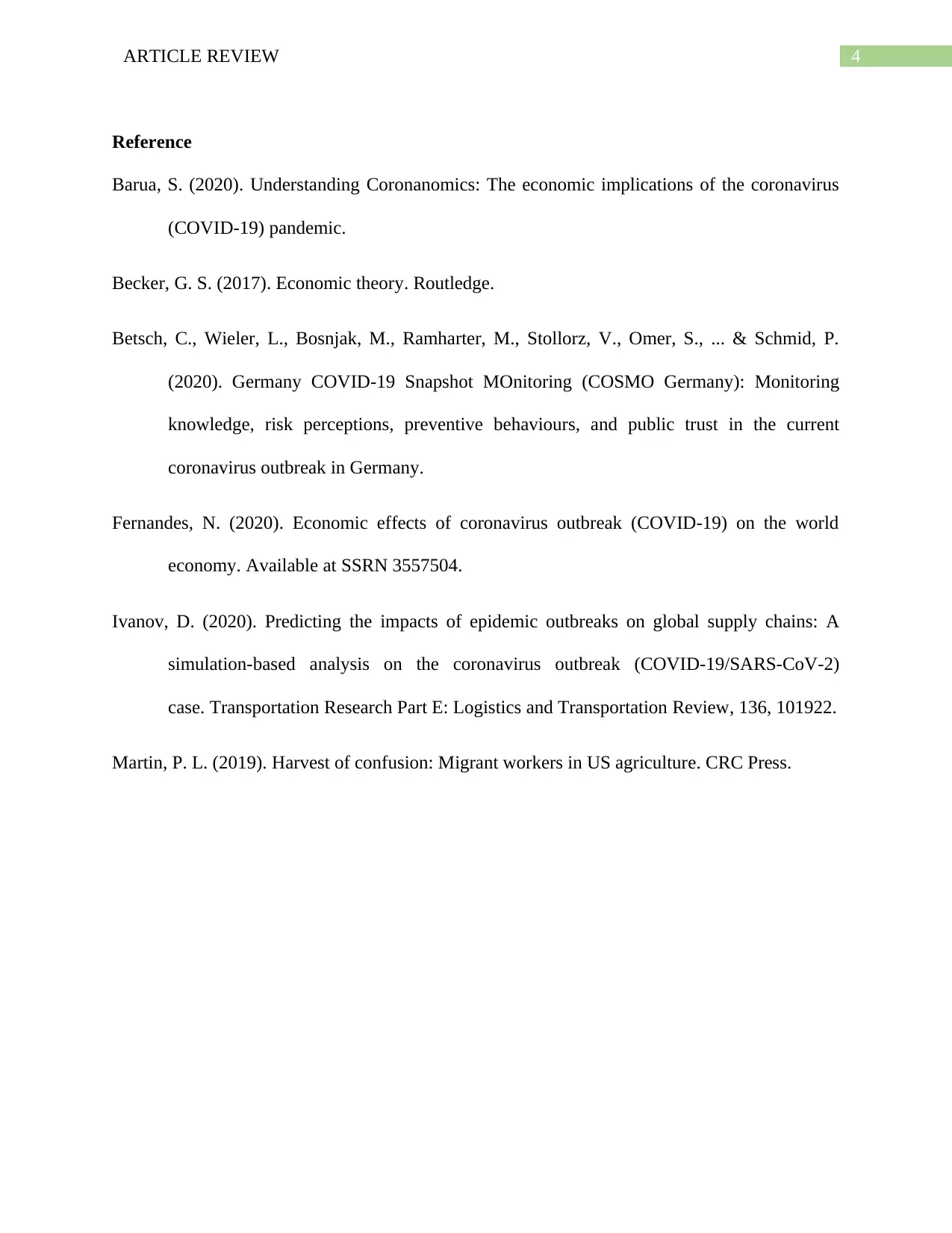
4ARTICLE REVIEW
Reference
Barua, S. (2020). Understanding Coronanomics: The economic implications of the coronavirus
(COVID-19) pandemic.
Becker, G. S. (2017). Economic theory. Routledge.
Betsch, C., Wieler, L., Bosnjak, M., Ramharter, M., Stollorz, V., Omer, S., ... & Schmid, P.
(2020). Germany COVID-19 Snapshot MOnitoring (COSMO Germany): Monitoring
knowledge, risk perceptions, preventive behaviours, and public trust in the current
coronavirus outbreak in Germany.
Fernandes, N. (2020). Economic effects of coronavirus outbreak (COVID-19) on the world
economy. Available at SSRN 3557504.
Ivanov, D. (2020). Predicting the impacts of epidemic outbreaks on global supply chains: A
simulation-based analysis on the coronavirus outbreak (COVID-19/SARS-CoV-2)
case. Transportation Research Part E: Logistics and Transportation Review, 136, 101922.
Martin, P. L. (2019). Harvest of confusion: Migrant workers in US agriculture. CRC Press.
Reference
Barua, S. (2020). Understanding Coronanomics: The economic implications of the coronavirus
(COVID-19) pandemic.
Becker, G. S. (2017). Economic theory. Routledge.
Betsch, C., Wieler, L., Bosnjak, M., Ramharter, M., Stollorz, V., Omer, S., ... & Schmid, P.
(2020). Germany COVID-19 Snapshot MOnitoring (COSMO Germany): Monitoring
knowledge, risk perceptions, preventive behaviours, and public trust in the current
coronavirus outbreak in Germany.
Fernandes, N. (2020). Economic effects of coronavirus outbreak (COVID-19) on the world
economy. Available at SSRN 3557504.
Ivanov, D. (2020). Predicting the impacts of epidemic outbreaks on global supply chains: A
simulation-based analysis on the coronavirus outbreak (COVID-19/SARS-CoV-2)
case. Transportation Research Part E: Logistics and Transportation Review, 136, 101922.
Martin, P. L. (2019). Harvest of confusion: Migrant workers in US agriculture. CRC Press.
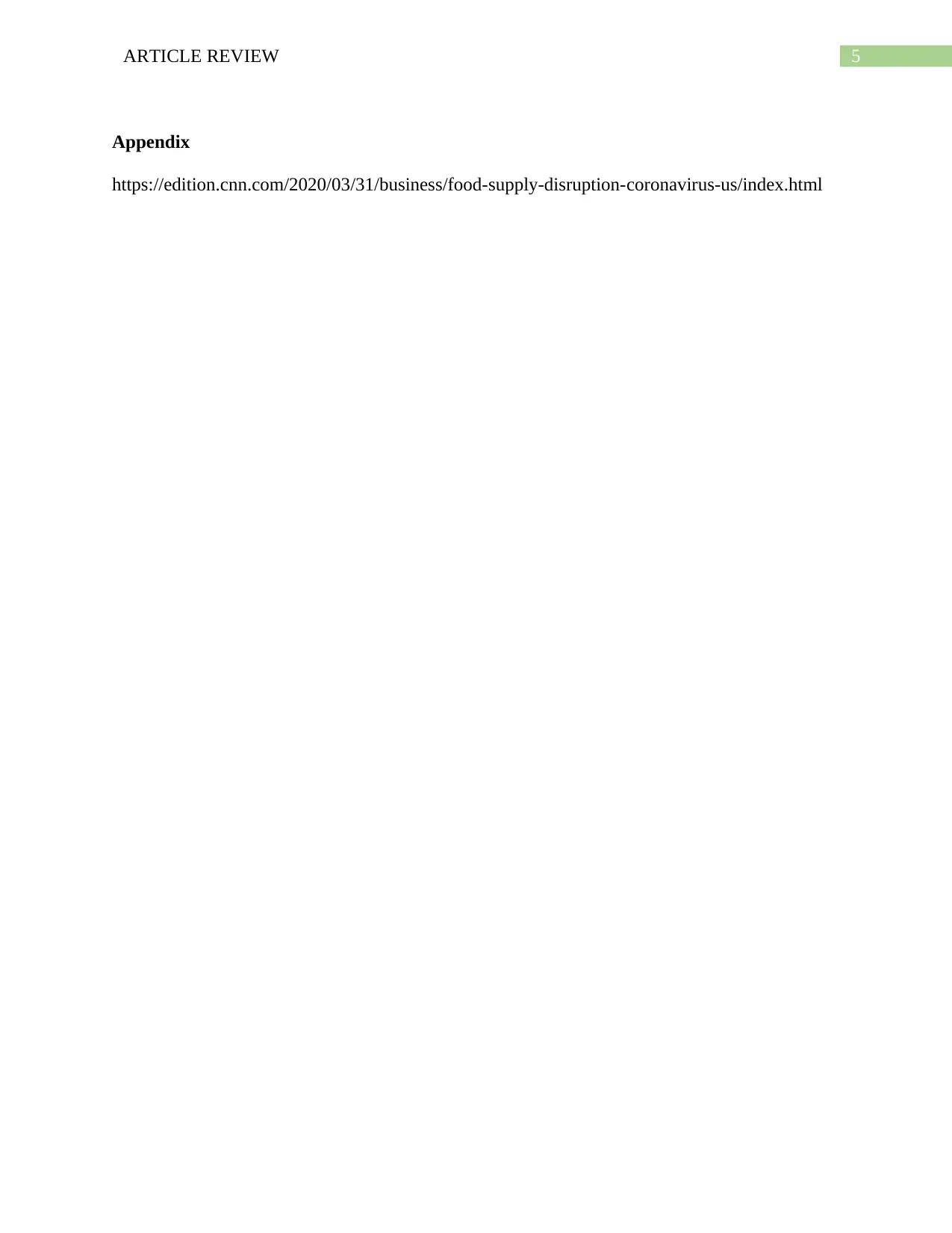
5ARTICLE REVIEW
Appendix
https://edition.cnn.com/2020/03/31/business/food-supply-disruption-coronavirus-us/index.html
Appendix
https://edition.cnn.com/2020/03/31/business/food-supply-disruption-coronavirus-us/index.html
⊘ This is a preview!⊘
Do you want full access?
Subscribe today to unlock all pages.

Trusted by 1+ million students worldwide
1 out of 6
Related Documents
Your All-in-One AI-Powered Toolkit for Academic Success.
+13062052269
info@desklib.com
Available 24*7 on WhatsApp / Email
![[object Object]](/_next/static/media/star-bottom.7253800d.svg)
Unlock your academic potential
Copyright © 2020–2026 A2Z Services. All Rights Reserved. Developed and managed by ZUCOL.





